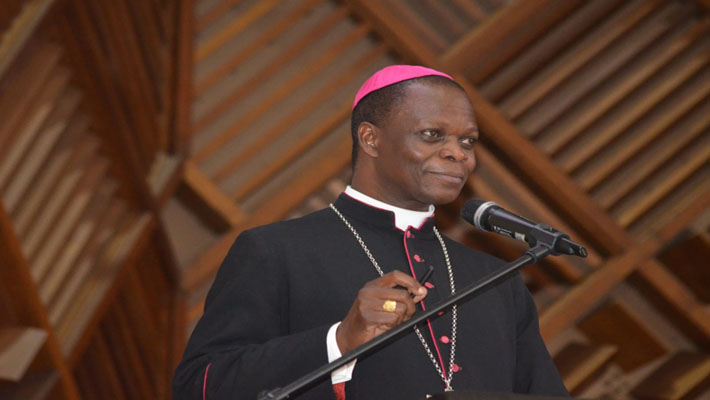By Paschal Norbert
NAIROBI, FEBRUARY 23, 2024 (CISA) – Most Rev Maurice Muhatia Makumba, the archbishop of the Catholic Metropolitan Archdiocese of Kisumu has warned that the present-day attacks on the understanding of the traditional African family and its values is a threat to the booming vocations to the priesthood and consecrated life in Africa.
“The crisis in Christian marriage and by extension crisis in the Christian family is bound to have unspeakable consequences on priestly vocations and vocations to consecrated life. The threats to the African family in the AMECEA region are real and they need pastoral responses that are alive to the social undercurrents including those that want to destroy the family altogether,” stated Archbishop Muhatia in his presentation on evangelization in the Association of Member Episcopal Conferences in Eastern Africa region (AMECEA) on February 22
The vice-chairperson of the Kenya Conference of Catholic Bishops (KCCB) was reflecting on the modern-day challenges of evangelizing in the AMECEA with a keen focus on the Post-Synodal Apostolic Exhortation Ecclesia in Africa of St. John Paul II at the two-day Tangaza University College Theological Symposium, themed “Make Disciples of all Nations: The Missionary Mandate of Christ (cf. Mt. 28:19-20) in the Religious, Cultural, and Social context of Africa Today.”
Archbishop Muhatia, while outlining the challenges of evangelization in Africa as presented in Ecclesia in Africa towards the year 2000, highlighted that whereas marriage and vocations to the priesthood and consecrated life were identified as serious challenges to the evangelization mission of the Church, the concern is, now even more, pressing especially, in the face of the targeted attacks on family and as Africa is experiencing a boom in vocations.
He explains, “The challenges to Christian marriage and family have never been unrelenting as in our time. St. John Paul in Ecclesia in Africa contends truly ‘the future of the world and the Church passes through the family’. The Synod also called for a special attention to the vocations to the priesthood and consecrated life whereas large sections of the Church in Africa especially in the AMECEA region are experiencing a boom in vocations to consecrated life and the sacred priesthood. In the face of concerted assault on Christian marriage and family, we cannot afford to take this moment of grace for granted.”
“The passionate appeal of the Synod fathers then was palpable. Do not allow the African family to be ridiculed on its own soil. Do not allow the international year of the family to become the year of the distraction of the family. This warning at that time was directed at the United Nations conference held in September 1994 in Cairo on African soil, which clearly sealed the wish to adopt resolutions clearly contradicting the values of the African family. It was literally a slap in the face,” he added.
In his presentation, the archbishop of Kisumu castigated the ‘woke’ culture of personal autonomy, personal freedom and individualism that is being used indiscriminately as an affront to the understanding of African traditional values.
He said, “One of the most formidable attacks on the family in recent times is the trivialization of the traditional understanding of the Christian marriage. Attempting to make it a matter of personal choice yet it cannot be forgotten that by its nature, marriage, which has a special mission of perpetuating humanity transcends that cap,” adding “In the same way by its nature, the family extends beyond the individual household. It is oriented toward society. The family it’s by nature a vocation opened to families and society and undertakes its social role.”
Archbishop Muhatia made an impassionate appeal for the protection of the African Christian Family, arguing that the development of the Christian Family has been a pastoral priority of the AMECEA and it’s anchored on their insistence on the growth of the Small Christian Communities (SCCs) in the region.
He maintained, “The Christian families of Africa, thus, become sub-domestic Churches, contributing to the society’s progress towards a more fraternal life. This is how African families are transformed through the gospel. To fail to appreciate this is to make nonsense of AMECEA’s insistence on small Christian communities as a pastoral priority.”
